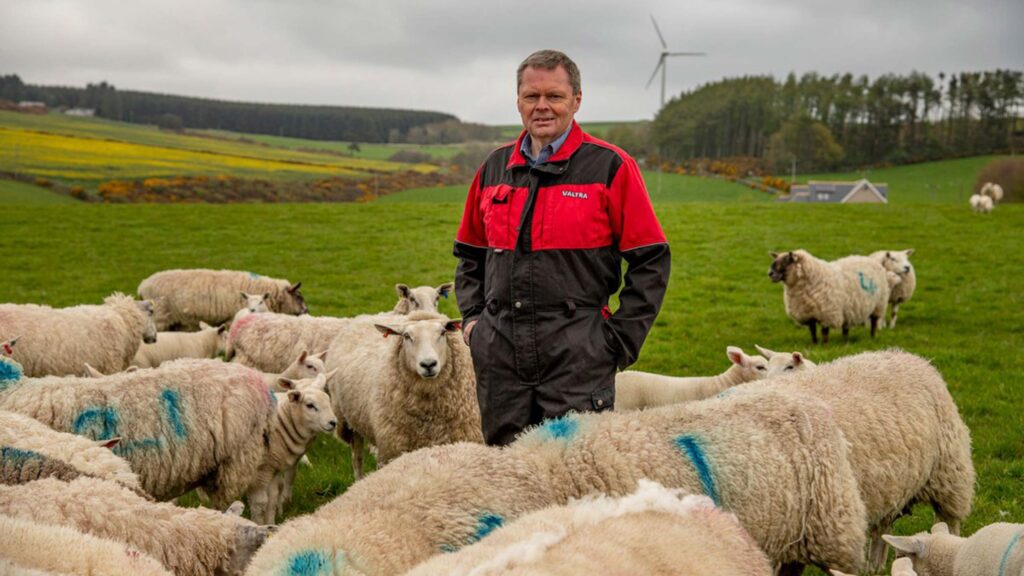Andrew Connon elected new president of NFU Scotland
 Andrew Connon © NFU Scotland
Andrew Connon © NFU Scotland Andrew Connon has been elected as the new president of NFU Scotland, succeeding Martin Kennedy after a four-year tenure.
Mr Connon, who has served as the union’s vice-president since 2021, was voted in after prevailing in a two-way contest with Alisdair Mcnab at the union’s annual meeting in Glasgow on Friday 7 February.
He brings a wealth of experience to the position, having worked in various agricultural roles throughout his career.
See also: NFU Scotland elections: Runners and riders reveal plans
Farming 150ha near Ellon in Aberdeenshire, he and his family focus on cattle finishing, sheep breeding and spring barley.
He has an extensive background in agricultural finance, having worked with NWS Bank, JCB Finance and the family-owned machinery business AM Phillip.
“There are difficult and challenging times ahead but [new vice-presidents] Duncan [Mcalister], Robert [Neill] and I have been given a clear mandate by members to represent them, and we are honoured to carry their message forward.
“I believe we have a top table team, who, backed by the members, staff and secretaries have the vision to deliver a sustainable and profitable future for Scotland’s farmers and crofters and the generations to come.
A long-standing member of NFUS, Mr Connon honed his leadership abilities as chairman of the North East regional board and vice-president of the union.
Mr Connon says one of his key priorities will be advocating for the retention of agricultural property relief from inheritance tax, which he views as vital for safeguarding farmers’ livelihoods in light of increasing financial pressures.
He is committed to growing the union’s membership, believing that expanding it to include the entire agricultural supply chain is crucial.
Mr Connon has also spoken about the importance of ensuring the long-term stability of farming through multi-year, ring-fenced budgets, and is passionate about addressing the challenges posed by climate change and technological innovation.
In his acceptance speech, he said it was a “huge honour” to be elected president, adding that now would be a time for “hard graft and steadfast determination”.
“I assure you I will do my very best to defend and promote our fantastic agricultural industry,” he added.
‘Fire in my belly’
Mr Connon’s vision for the future of Scottish farming includes a commitment to tackling environmental challenges while maintaining profitability and ensuring a strong, united agricultural front.
“I have the fire in my belly to defend farming and crofting across Scotland,” he has said.
He also paid tribute to his predecessor for the enormous contribution he had made to Scottish agriculture.
Mr Kennedy stepped down after completing his maximum four-year term as president.
Two new NFUS vice-presidents revealed
Robert Neill and Duncan Mcalister have been elected as the two new vice-presidents of NFU Scotland (NFUS), bringing fresh perspectives and strong commitments to the farming industry.
The third candidate, Michael Davis, a first generation farmer from Aberdeenshire, lost out in the three-way contest for the two posts.
Mr Neill, a tenant farmer in the Scottish Borders and the 2017 Farmers Weekly Farmer of the Year, has a mixed farming operation including cereals and suckler cows.
He is a long-time advocate for tenant farmers and young entrants, focusing on improving membership engagement and advocating for greater support for those entering the industry.
“I want to secure a profitable future for young new entrants in agriculture,” he said.
Mr Neill has extensive experience in various agricultural organisations, including serving as chairman of the South of Scotland and Borders Valuers’ Association and as vice-chairman of NFUS’s Lothians and Borders region.
Duncan Macalister, chairman of NFUS Argyll and Isles region, has more than 25 years of experience in the farming sector.
He runs a 809ha mixed livestock farm on the Kintyre peninsula and is focused on improving communication and collaboration within the agricultural community.
Mr Macalister will be seeking greater co-operation between farming unions, particularly on issues such as inheritance tax.
A key priority for him is improving ferry services for island farmers, citing connectivity as a major challenge. Mr Macalister’s farming background includes diversified projects, such as a community wind farm and forestry.
